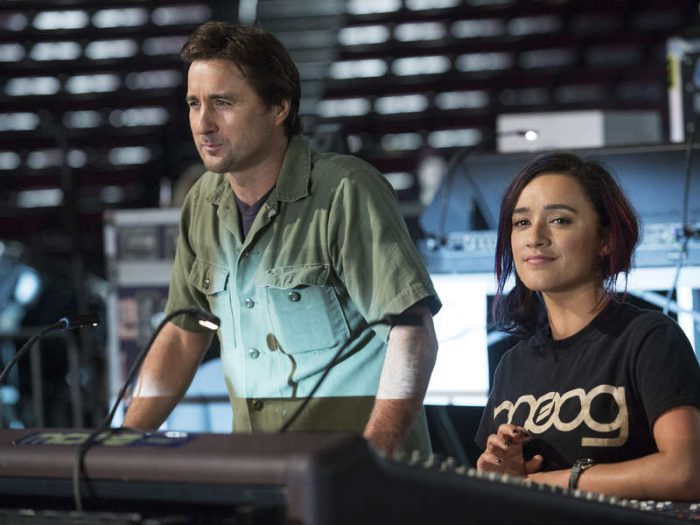UK TV review: Roadies (Episode 1 and 2)
Review Overview
Actors trying to elevate material
5The material that needs elevating
4Josh Slater-Williams | On 07, Jul 2016
There comes a time in every music lover’s life where an artist or band they once idolised, or at least reaped significant enjoyment from, starts to sag artistically to a degree you can no longer support. A lot of the time it’s not even due to a calamitous change of artistic direction or some scandal outside of the work impacting your appreciation. The beats and notes are still there, they’re just stale, because the grip on their skills and understanding of them has deteriorated with time. What was once idiosyncratic and inspiring becomes someone going-through-the-motions with increasingly inferior results. Some artists just seem destined only to be meaningful for a particular time, and when they hang around too long, their hesitance or refusal to update their formula in a meaningful way ends up losing many to whom they were once so important.
It happens with film, too. Quentin Tarantino is very vocal about not wanting to be one of those directors who hang around too long. But it seems relevant to bring up music first regarding the creative force behind television series Roadies: Cameron Crowe, the man behind Almost Famous and curator of some of the most beloved film soundtracks of the last couple of decades.
Largely in part to his own background in music journalism (as detailed in the semi-autobiographical Almost Famous), Crowe is a filmmaker who makes a love of music and its power a key part of a significant chunk of his filmography as a writer-director. And another defining aspect of his works is a palpable sincerity and generosity of spirit. In recent years, with the likes of We Bought a Zoo and Aloha, that sincerity has lapsed into what many would label as corniness or shameless, shallow emotional manipulation. Despite being a theoretical return to the mode of Almost Famous, the register of Roadies, which Crowe writes and directs, is unfortunately consistent with the latter efforts.
As indicated by the title, Roadies is concerned with the crew behind the scenes of a touring stadium rock group, and each episode follows their journey to a new city, with the first two episodes stopping off at New Orleans and Memphis. Unlike HBO’s Vinyl from earlier this year, Crowe – perhaps wisely – holds back from showing/playing you the music of the fictional band that has everybody in thrall, in this case a group called The Staton-House Band that you get the impression is a blend of Kings of Leon, Foo Fighters, and the fictional Stillwater from Almost Famous. Unlike Vinyl, Roadies is set in the present day, as it is wont to remind you with oh-so-many references to social media and Taylor Swift.
It’s pretty firmly stuck in the past too, however. Like Crowe, most of the older characters are riding on past glories. You have a legendary roadie played by Ron White, who seems to be there mostly to rail off a list of legendary acts from the rock pantheon that Crowe considers worthy. You have Luke Wilson’s tour manager, Bill, and Carla Gugino’s production manager, Shelli, who have a sort of ‘will they, won’t they’ relationship that’s based on frequently referencing past events and unseen characters, but there’s never a successful depiction of actual inner lives there.
Among the younger members of the ensemble, you have Imogen Poots’ Kelly Ann, an aspiring filmmaker toying with leaving the crew to pursue a confirmed place at a New York film school, partly because she doesn’t feel inspired by the band’s music anymore (hey, that sounds familiar). In line with the show’s proclivity towards namedropping as a means of characterisation, the second episode sees her reference having been emailed by Spike Lee about her short film. Based on the sense we’re given of her short film, it seems possible that Crowe is severely underestimating Spike Lee’s judgement.
At this point, it’s worth considering the validity of picking on Roadies solely within the bubble of Crowe’s past glories. Is it only bad because he used to do so much better? Well, no. While a lot of the problems on display are consistent with the quality trajectory of the show’s chief creative force, the first two episodes showcase dodgy material that sticks out like a sore thumb, even outside of the auteurist echo chamber. The first one, in particular, is home to an embarrassing subplot concerning a stalker that veers so strongly into misogyny that the only reason it’s unlikely to inspire a thousand think-pieces is that most people might struggle to even get that far into the episode.
Elsewhere, there’s a fundamental problem with practically every character operating as little more than a vessel for grandiose statements regarding the power of music. It’s not even just the aforementioned Ron White character, whose prominence is trimmed significantly between episodes: almost everyone comes across as a lecturer on the history of rock music, even to fellow employees whom you’d think would be pretty clued in. Rafe Spall’s new management lackey, brought in to keep tabs on the budget, is depicted as a figure of hate and mockery for the established crew because he doesn’t get the music (maaaaannnn), but he’s really the only one on screen who resembles anything close to a fully-rounded person; he’s the only one whose primary mode of communication isn’t grand gestures and pompous rhapsodising. With Roadies, Crowe definitely manages to get across a sense of community, but he hasn’t populated it with recognisable humans.
Roadies is available to watch online in the UK exclusively on Amazon Prime Video.
Photo: Katie Yu/SHOWTIME


















